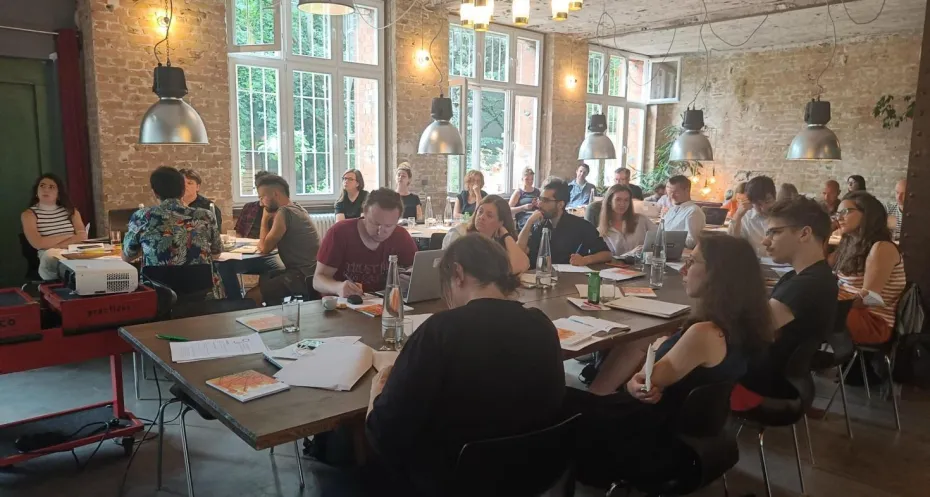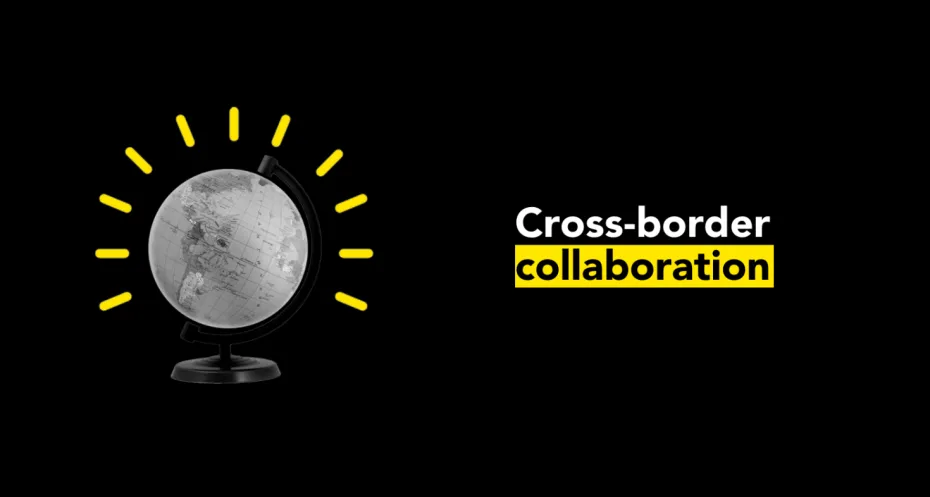The Collaborative and Investigative Journalism Initiative awards ten reporting grants

Ten cross-border investigative journalism teams have been awarded a combined total of 50 000 Euros within the Collaborative and Investigative Journalism Initiative (CIJI).
An independent jury representing The Baltic Centre for Investigative Journalism Re:Baltica (Latvia), OBC Transeuropa (Italy) and Fundacja Reporterow (Poland), selected the winning projects covering topics such as exploitation of Ukrainian war refugees; disinformation campaigns against humanitarian activists at the Polish-Lithuanian-Belorussian border; public figures in Europe pushing Russian propaganda; the hidden network of far-right ideologies and the spiritual world in Europe; social and economic dynamics of illegal fishing in Italy and Greece, and more.
Winning teams will be paired with a mentor who will provide individual guidance in the course of the project. The stories are expected to be published in August-September 2022.
Run in partnership by Reporters Without Borders (RSF), Free Press Unlimited (FPU) and Tactical Tech (TT), CIJI aims to equip independent media outlets and individual journalists with resources, innovative networking infrastructure and standards-based methods that enable them to practise high-quality, ethical and accountable collaborative and investigative journalism.
These are the winning projects:
“How public figures are pushing Russian propaganda”
This investigation will expose universal patterns of far-right and far-left pundits and propagandists in five European countries: Estonia, Hungary, Latvia, Lithuania and Poland. What might seem as local isolated “propaganda incidents”, are in fact part of the much bigger misinformation campaign targeted to wider audiences and using similar patterns. Carried out by an international team of journalists, the results will be published by leading media outlets in the five target countries.
“Investigating Czech and Slovak companies registered in tax havens”
This investigation will explore Czech and Slovak companies registered in tax havens. It will use a follow-the-money approach to track their dividends and subsequent investments. The project is a collaboration between two media in the two respective states. Deník Referendum (DR) is a Czech online daily with a strong focus on social and environmental issues and investigative reporting. Investigatívne centrum Jána Kuciaka (ICJK), a member of the OCCRP, investigates corruption, money laundering, arms and narcotics dealing, and other aspects of organised crime. The team is comprised of Lukáš Diko who is the editor-in-chief of ICJK, Gaby Khazalová, a reporter and editor at DR who received the European Press Prize Innovation Award 2022, Lucie Čejková, a reporter and former climate journalist at DR, and Daniel Kotecký who is an analyst of the investigative team at DR.
“Polish and Lithuanian governmental officials and border guards spreading disinformation about human rights activists providing humanitarian aid to migrants at the Polish-Lithuanian-Belarusian border.”
Two freelance journalists - one Lithuanian and one Polish - joined efforts to investigate obstacles that were faced by countries' activists providing humanitarian help to migrants stuck at the EU border with Belarus. The particular focus is on disinformation campaigns that the volunteers have to constantly counter. At the end of the project the story will be published in leading media channels in both countries - Gazeta Wyborcza and NARA.
“Extremist and conspiratorial: the hidden network of far-right ideologies and the world of contemporary spirituality in Europe”
As today we can sense the presence of a dangerous rapprochement between conspiracy, contemporary spirituality, and extremist ideologies, the collaborative investigation would delve into the world of ‘conspirituality’ to frame the propagation of ideologies linked to extreme far-right groups. Focusing on Italy and the Czech Republic, the project unveils the hidden cross-border network and dynamics fueling - and benefitting from - mass disinformation in Europe, from understanding the role of spiritual influencers to gathering insights from academic experts. The investigation will be conducted by Sofia Cherici, a freelance multimedia journalist and investigative reporter from Italy, and Jan Žabka, an investigative journalist from Czech Republic. They will coordinate with various European media partners and publications, including Irpi Media, Transitions, and HlídacíPes.org.
“Fish Chain Tracking”
The investigation aims to reveal the social and economic dynamics behind illegal fishing in Greece and Italy, where a mix of unlawful fishing techniques and violation of protected areas are threatening the sustainability of Mediterranean ecosystems, while traditional fishermen struggle to stay in the business.
“In the hands of the church”
This investigation aims to explore the role of the Pentecostal churches in human trafficking of Nigerian women in Italy, Spain and Greece. Pentecostal churches are playing a singular and pervasive role in the African communities in Europe: they support their newly arrived members’ search for housing, jobs, and residency permits. In church, people socialise, pray, eat, and spend their free time together. In some cases, these places can also become a hub for illegal trafficking. The investigation will be conducted by Alice Facchini, journalist based in Bologna (Italy) and specialised in social issues and human rights, Kostas Koukoumakas, journalist based in Athens (Greece) covering politics and organised crime, and Elena Ledda, journalist based in Barcelona (Spain), specialised in gender issues and women's rights. The story will be published on IRPI media, News247 and El Pais.
“Two systems, one EU: the reception of Ukrainian refugees in Hungary and Italy”
This project aims to investigate the Hungarian and Italian approaches to the reception of refugees, starting with Ukrainians, to then encompass all nationalities. The team wants to shed light on the critical issues of these countries’ general reception regulations, the differences and similarities between them and the systemic weakness of the European Union on this matter. The project will make use of an innovative method that mixes data journalism techniques with field research, in order to create a data-driven journalistic investigation. Fondazione Openpolis will work mainly on the data side, thanks to its consolidated team of data analysts, scientists and journalists, who have been dealing with migration issues for years. On the other hand, the freelance contributors have a consolidated experience with field investigations and with Hungarian politics and its dynamics.
“EU Green Fuel Fueling Deforestation”
The team, consisting of freelance journalist Stefano Valentino and Voxeurop staff editor Gianpaolo Accardo, will track the supply chain of palm oil from deforestation areas in Indonesia to gas stations in Europe where "fake" green fuel is sold to car drivers.
“I love you”
I LOVE YOU is an investigation analysing probably the most controversial form of fraud - „romance“ scamming. Scammers use fake accounts and stolen data, create „characters“ and go the extra mile to build romantic relationships with a survivor. Even though survivors usually lose a great amount of money in the end and their lives are broken, most cases are discontinued in both Lithuania and Slovakia. The team of three journalists - Lenka Hanikova, Mantas Jusis and Irma Bogdanovičiūtė - unravel the mystery around the most common schemes of the „romance“ scam and the reasons for the justice system failing to safeguard the survivors.
“Cheap Ukrainians”
Two journalists from brotherly countries unite their skills in the fight against human exploitation and illegal workers trade. Miglė Kranceviciute from Lithuania and Yanina Korniienko from Ukraine will investigate and showcase how one organisation with purpose to gain financial benefit for itself, tricks Ukrainian refugees into illegal work schemes with less pay and longer work hours, sometimes making people live in poor conditions with no social care. Investigation includes Lithuania, Ukraine, Poland and Germany where reporters know for sure, people are being deceived. Two reporters strongly believe that their investigation should make both local and global changes - lawsuits for unfair business and change of regulations, that in the past, as reporters saw, have been successfully bypassed.
Background information about the process
The calls for applications ran between May - June 2022 and were open to journalists residing or publishing for media targeting audiences in the Baltic countries, Visegrád Four and Southern Europe, as well as journalists from Ukraine, Belarus or Russia who are currently legally residing in the EU and and had to leave their own countries as a result of the war in Ukraine and/or related to it imposed media censorship in Belarus and Russia.
Story pitches were accepted within the following thematic areas: Human rights and migration; Disinformation; Environmental crime; Corruption and money laundering.
The criteria used to select the projects include editorial quality, story relevance, reach and impact, project feasibility and applicants’ experience, while ensuring country representation and theme balance.
This project is co-funded by the European Commission under the Pilot Project: Supporting investigative journalism and media freedom in the EU (DG CONNECT).
For any questions, please contact Diana Lungu (lungu@freepressunlimited.org) and Yevgeniya Plakhina (zhenya@fpee.eu). For project background, visit ciji.eu



